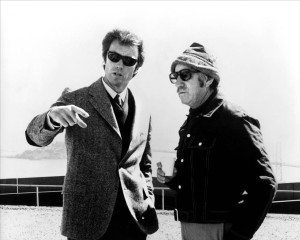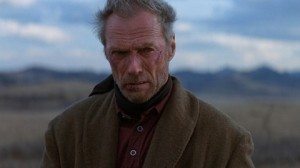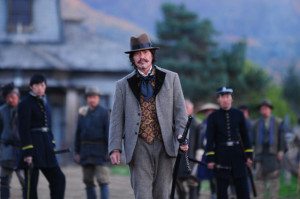It’s not often a remake is any good, but there are exceptions. Watching this trailer for the upcoming Japanese remake of Unforgiven (’92), one can’t help but think of Leone’s Clint Eastwood starring remake of Kurosawa’s Yojimbo, A Fistful of Dollars. This time it’s in reverse. The Eastwood movie is being remade by a Japanese director, Sang-il Lee.
It’s almost better to watch the version of the trailer without subtitles. If you know the original—and you do—you’ll know exactly what’s going on. But in the interest of checking out the new dialogue in familiar scenes, here it is with the English translation:
Usually when a movie is remade, it’s remade drastically. At least drastically enough that one can rant and rage about how the core beauty of the original was taken out and beaten to death with a tire iron, and why, if you’re going to take out what was best about the original, remake the damn thing in the first place? Zack Snyder’s brain-dead remake of Romero’s Dawn of The Dead comes immediately to mind. Or how about the Keanu Reeves version of The Day The Earth Stood Still? One sheds a tear at the mere memory of its existence.
So it’s unusual that this Unforgiven remake, while the dialogue appears to have been heavily altered, looks like it follows David Webb Peoples’s script scene for scene. Is this a good thing? In the case of Unforgiven, yes. I’ve actually long thought, in my blasphemous way, that it’d be a perfect movie to remake.
Let’s see if I can unpack why.
Unforgiven is the best movie Clint Eastwood ever directed. Better than The Outlaw Josey Wales, better than…(pause while I scan IMDB)…okay, so there’s not much competition, but the point is, Unforgiven is a great movie. I loved it when it came out, I loved it on every subsequent viewing, and after not watching it for maybe a decade, I loved it the other night when I watched the blu-ray of it. It’s one of the most quotable movies ever made. The script is pure dynamite. Famously, Eastwood bought it from David Webb Peoples and then sat on it for a decade until he was old enough to play the part. Then he shot the thing page for page, word for word. An unheard of thing to do. It’s full of great performances. It’s by now a classic western.
So why remake it?
The thing is, as my IMDB perusal above reminds us, Eastwood has never been a great director. He’s not bad. Sometimes he’s perfectly good. Don Siegel was his inspiration and mentor (Siegel directed Eastwood in The Beguiled and Dirty Harry, among others). He taught Eastwood the style of having no style, of adapting one’s methods to the script at hand, and shooting it in as simple and unostentatious a manner as possible, a perfectly reasonable way to direct pictures, and one Siegel pulled off with, I’m afraid, far more panache than Eastwood ever has.
In the case of Unforgiven, Eastwood’s direction is just fine. It gets the job done. It’s not showy. Some scenes are suitably atmospheric. Others are lit blandly. The look is very much of its era. You know you’re in the ‘90s right away, something about the colors and the lighting. It’s edited well enough, yet the only real sense of flow to the picture comes from its genius script.
Which is what this all comes down to. The script is better than the movie. What Eastwood managed to do was to stay out of his own way, shoot the thing as written, and move on. The result is a great movie. Likewise, when he shoots the many average-to-awful scripts he typically chooses, the resulting movies are average-to-awful.
Unforgiven is missing something, something a great director could have given it. It’s missing a sense of itself, a sense that it understands its own deeper meanings, its mythological elements. Which are exactly the kinds of things Eastwood studiously ignores. His interest is in the character, the old killer, wise and weary, taking revenge one last time. Which is great stuff. It’s just that the story goes so much deeper.
Eastwood’s character, William Munny, is a retired killer, a monster, a harbinger of doom. He brings death wherever he goes. He’s introduced slogging around in the mud with a styful of hogs. He’s a demon. He doesn’t care that the story of what the two cowboys did to the whores was a lie. He’s going to kill them anyway, because that’s what he was hired to do. It’s enough that he’s being paid. In the process he causes the death of his best and oldest friend and turns the Kid into a murderer. He rains death down on an entire town. He goes against everything he claims he’s become and reverts to being a monster, and then? When it’s all over? We get a crawl telling us he moved away and lived a mildly successful life as a businessman. Well, isn’t that nice for him? We root for him in this movie, but he’s evil personified. All of this is in the script, so it’s there in the movie, but it’s as though Eastwood isn’t quite aware of it. He doesn’t use the subtext at all.
Which, granted, doing so can be a terrible idea. Overly stylistic directors might whack you in the face with subtext, and there’s nothing worse than that. The point is not that Unforgiven is bad–I love it!–it’s that there’s more inside of it than it knows. The script is so resonant that a different take on it, without changing a word, could elicit a much different, much darker, much more mythical movie.
The biggest hurdle in remaking Unforgiven would be the cast. His direction aside, Eastwood embodies the character perfectly. And no one could top Gene Hackman as the miserable bastard sheriff, Little Bill.
So for that reason alone, a Japanese remake, set in a different country with unknown actors (to Americans, anyway, and with the exception of leading man Ken Watanabe), may be the best way to erase memories of the earlier version and allow the story to be seen anew.
On the minus side, it looks like much of Peoples’s dialogue has been changed, which can hardly be for the better. The lines in the trailer are admittedly a bit worrisome in their bluntness with regards theme.
But so it goes. It’s a hell of a thing, remaking a famous movie. In this case, I remain cautiously optimistic.




i was just thinking about these themes having watched The Act of Killing last night (talk about a great double feature….).
i don’t think Munny is evil personified. i think Munny is a reminder that evil and horror lie just under the surface of our lives, waiting for an excuse to emerge; be that excuse a sheriff’s badge, a bounty offered, or a dream of infamy. Munny kills these men for money to save his family—an excuse. later, he kills Little Bill for revenge. it is the contrast between these two sides of Munny that makes the film fascinating to me. he is a human who does awful things reluctantly and then a monster unleashed. he is both things and more.
does either (any) excuse make his actions forgivable? nope. but they make him human and not a monster, which is the scary thing. because humans frequently become monsters, when the right excuse presents.
and when that excuse wanes, they are businessmen who live happily ever after without distinction.
That’s all true. And that’s the movie Eastwood made. But there’s something more to this script. The evil you’re talking about isn’t in everyone, or if it is, in most people it’s buried so deep that it won’t ever come out. The Scofield Kid shoots a man, and look what it does to him. He’s done. Ned gave up his gun long ago, he goes along for the ride, but he turns around and leaves. Only Munny sees it through to the end. Only Munny seeks revenge.
It’s a story about calling up evil, and reaping the horror that comes with it. Little Bill is a sadistic swine, but he’s also the one guy who sees things clearly. He tells the real story of English Bob’s exploits. He understands what it means to call up bounty hunters. The most important line in the movie is when Munny kills him: ‘Deserve’s got nothin’ to do with it.’ Evil is evoked, and it will run its course.
Good. Yes. I guess I’m just in weird place today vis-a-vis ‘evil.’ Today evil doesn’t seem to actually exist, and certainly not as something supernatural that must run its course once evoked. Which, I realize, isn’t really what you’re really saying.
I am today resistant to adding a mythical level to the story, whether or not it deserves to be seen. I really will have to write up an Act of Killing / Unforgiven double feature someday soon.
I think we’re on the same page. I also do not think there is a thing called ‘evil’ that exists someplace. People do things. Some of things are so horrifying that other people call them ‘evil.’ And those evil things may be very difficult to comprehend. How could someone do something so awful, we ask? One way to try to make sense of such things is to externalize it. Which is basically why there are horror movies.
So Twin Peaks is about (spoiler alert) a man who systematically rapes and eventually murders his own daughter. How on earth to make sense of that? Lynch does so by saying there is an evil being with a face and a name–Bob–who is out there and who inhabits people and makes them act in opposition to who they really are. It’s a way for us to wrap our heads around things too ghastly to make sense of.
The idea of trying to right a perceived evil by committing another evil against the perpetrator, only to find that once evoked, evil does what it does, and cannot be controlled, is certainly thousands of years old. It’s the kind of myth that appears in every culture.
Unforgiven, I think, finds some of its power in that kind of myth underlying the story. I don’t think Eastwood is unaware of that, but I also think that as a director, he’s not going to do anything to accentuate that fact. He’s just going to put the script on screen. If a director more inclined to those notions had directed the script, it could have been still more powerful and evocative and dark. Not by changing the script, but through mood and imagery.
This Japanese remake may not be addressing such notions at all. But it’s what I found myself thinking the last time I watched Unforgiven.
Great film, I’m looking forward to the remake. It looks interesting.
I’ve heard the story of Eastwood sitting on the script before, that’s some real patience.
What are your favourite scripts?
Miller’s Crossing. Dog Day Afternoon. And others that are escaping my un-caffeinated mind at the moment. Yours?